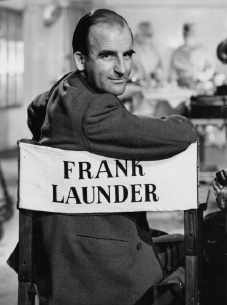Frank Launder
Frank Launder, master of British humour, died on February 23rd 1997, aged 89
As a footnote to the Ten Command- ments, Hilaire Belloc suggested: “Candidates should not attempt more than six of these.” If this sounds funny, it may be that you appreciate that quirky thing called British humour. If not, best not to bother. Belloc took more than 30 years to become British, overcoming the handicap of being born in France. The British Council teaches “British humour” to foreigners, but some believe this is itself an example of British humour.
The Britishness of Frank Launder’s humour was the main reason why most of his films never travelled well. In the 1950s British audiences from Newcastle to Newport were in fits over the goings on in an unruly girls’ school called St Trinian’s, but in New York, let alone Little Rock, these scenes were received with bafflement. American family values at the time owed much to 15 years of sentimental Andy Hardy films, in which Mickey Rooney’s adolescence had been phenomenally extended. In Mr Launder’s films, by contrast, there were wild schoolgirls showing a shameful amount of leg in their black stockings and gymslips, and, most oddly, their school was in the charge of a man dressed as a woman.
The New Yorker and other classy magazines praised Mr Launder’s films. Comics who wore women’s clothes, they explained, were continuing a tradition of the dame in English pantomime. They deplored the prudishness of American censors who had got Mr Launder to reshoot a scene in another film of his, “The Rake’s Progress”, in which Rex Harrison climbs an Oxford steeple to crown it with a potty. In the American version of the film, renamed “Notorious Gentleman”, a top hat is used. But Mr Launder’s American friends were addressing a relatively tiny audience. His productions were dismissed by Hollywood as cult films, the polite term for turkeys.
In Britain Frank Launder’s films are still regarded as very watchable, to the extent that they are given good slots on television. More important, perhaps, they are seen as a link in a long chain of British humour. In the beginning, inevitably, was Lewis Carroll. Innumerable references to “Alice” turn up all the time in speeches and journalism. A smattering of scholarship underpins much of British humour. ITMA, the most famous of the British radio comedies in the second world war, and the brilliantly awful “Carry On” films have occasional literary jokes, as do Mr Launder’s films. “The Goons”, on the radio, and “Monty Python’s Flying Circus”, on television, which later gave a new thrust to British humour, are loaded with artful literary references. Often the references are missed, but get a laugh anyway.
Frank Launder’s literary scholarship seems to have been picked up as he went along. He had, he said, little education, but was a compulsive reader. When he started in films in 1928 they were still silent. He wrote the captions, and was paid £4 a week (about $16 in those days).
In 1936 he gained attention and some more pay when he wrote the script of “The Lady Vanishes” in collaboration with Sidney Gilliat (his partner in many subsequent films).
“The Lady Vanishes”, directed by

Alfred Hitchcock, has something of the endurance of “Casablanca”. Both are daft stories, quickly and cheaply made, but have the fascination of antiques that mirror an era. “The Lady Vanishes” is a melodrama, but for it Mr Launder invented two comic characters, Charters and Caldicott (Basil Radford and Naunton Wayne). Although Mr Launder said his films were solely to entertain, part of the entertainment was to show the British class system in its more absurd forms. Charters and Caldicott are upper-class buffoons, more interested in cricket scores than the imminent war. Class is an inviting battleground for satirists. The “idiotic and splendidly senseless” St Trinian’s girls, as an admiring critic called them, were obviously from privileged homes. The staff at the terrible school were played by Alastair Sim and Joyce Grenfell,issuing their pointless orders in stately accents.
During the war Mr Launder made “Millions Like Us”, about women factory workers. It is warm rather than funny. Mr Launder never made political statements, but it seems likely that his sympathies were with what is now called the disadvantaged. His film that he liked best was “Geordie”, about a poor boy who has success as an athlete. The director he most admired was René Clair, who like Mr Launder had a talent for fantastic satire, but also, as in “Sous les Toits de Paris”, saw value in ordinary people.
Frank Launder’s good fortune was to be a film-maker when the industry was presided over by a rich and generous patron. This was Arthur Rank, who had made millions as a miller, producing the flour for much of Britain’s rather awful bread, and then became infatuated with the glamour of films. “We would go to Mr Rank,” Mr Launder recalled, “and tell him we have a story. He says, ‘How much?’ We tell him. He hands it over and that’s that. We then go about our business.” The miller’s tale. Quite amusing really, in a British sort of way.